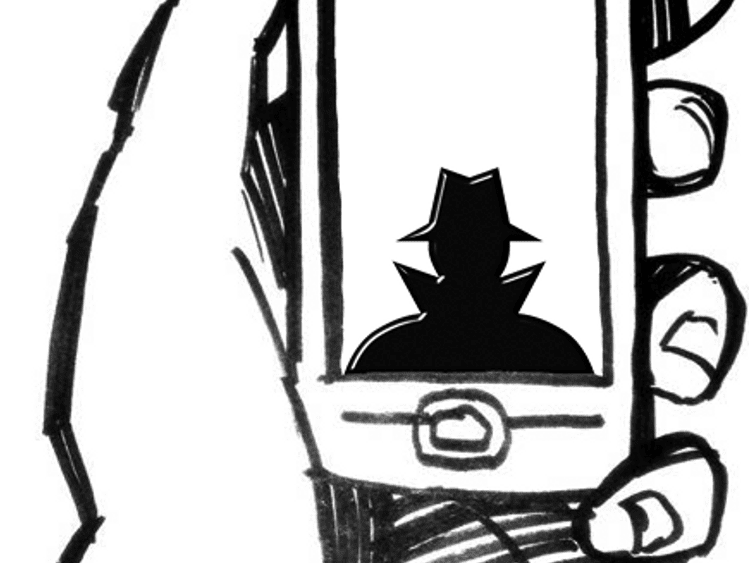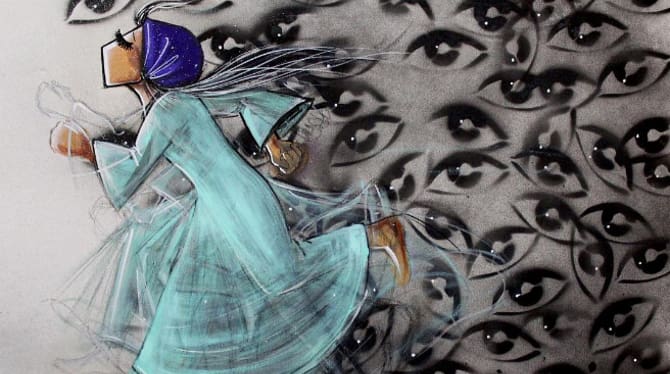Transcribed from the 21 March 2015 episode of This is Hell! Radio and printed with permission. Edited for space and readability. Listen to the whole interview:
“Social democracy, fascism, and state communism are a lot more similar, in certain structural ways, than any of them want to admit. The leftwing critique was always to point that out. Now it’s the right saying that. They say anything that looks like a welfare state is both communist and fascist at the same time. But that critique no longer has anything to do with what’s going on.”
Chuck Mertz: The total, brutal, oppressive bureaucracy we find ourselves living in today is a creation of our own choosing. Here to tell us how we can still choose another way before it’s too late, David Graeber is the author of the new book The Utopia of Rules: On Technology, Stupidity, and the Secret Joys of Bureaucracy. Welcome back to This is Hell!, David.
David Graeber: Thanks for having me! Hello.
CM: You write, “Nowadays, nobody talks about bureaucracy. But in the middle of the last century, particularly in the late sixties and early seventies, the word was everywhere. Everyone seemed to feel that the foibles and absurdities of bureaucratic life and bureaucratic procedures were one of the defining features of modern existence, and as such eminently worth discussing. But since the 1970s there has been a peculiar falling off.”
To you, what explains this falling off? It’s not like work life is any less bureaucratic simply because it has become paperless. Do you think that’s part of it?
DG: Yeah, our lives are engulfed in paperwork—but it’s not actually paper. So that’s part of it. But part of it, too, has to do with changing assumptions about bureaucracy. When we hear the word “bureaucracy,” we think “big government;” civil servants, “pointy-headed” bureaucrats (George Wallace made that expression famous). It always refers to annoying government people who are trying to limit the market and limit our free ability to talk and barter and engage in free contracts.
The moment I mention the word “bureaucracy,” people start talking about the government. But in fact, 95% of the bureaucracy that we deal with day-to-day either has nothing to do with government at all or is this weird synthesis of public and private—at which point distinctions between corporate bureaucracies and government bureaucracies are almost meaningless.
I give the example of banks. I was on the phone with Bank of America because they introduced this new security system and it became impossible to check my account from outside the US (I live in England now). I was just trying to figure out how I could check my account; it took about an hour. I got bounced back and forth between seventeen desks, and had to reenter all sorts of data four or five times because they kept losing it. Classic bureaucratic runaround, right?
Now, was that public or private? It’s a private bank. But if you complain to the bank, they always say the same thing: “Well, you know, there are all these government regulations that really tie our hands. It’s complicated.” But if you look at how they actually come up with those government regulations, half of it’s written by the bank. They have their lobbyists, they come up with proposals, they give a lot of money to politicians, they sit down with them and they work something out.
So the bank writes the regulations which the government uses to regulate it…but also to regulate us. Almost everything we do is regulated by these weird public-private hybrid rules and laws.
CM: You write how the mainstream left, or what is supposed to pass for the left these days, has “come to offer little more than a watered-down version of the right wing’s language when it comes to being critical of bureaucracy. Bill Clinton, for instance, had spent so much of his career bashing civil servants that after the Oklahoma City bombing he actually felt moved to remind Americans that public servants were ‘human beings unto themselves,’ and promised never to use the word ‘bureaucrat’ again.”
Why are “bureaucrats” such a vulnerable target, when it’s something we depend on so much? Why do they seem to lack a voice?
DG: Because our actual experience of bureaucrats is one of annoying, officious people who make you feel like an idiot. This is something that as an anthropologist I find quite fascinating. Why is it that when we are in a bureaucratic environment, not only is the whole thing set up to make us feel like an idiot, but we actually start to act like an idiot?
I mean, I like to think that I’m a fairly smart guy. But I find myself, when I’m filling out forms, just making obvious, stupid mistakes. Then when people look at me like I’m an idiot, I’m like, “Oh my god, they’re right! I put the thing on the wrong line.” There’s something about the experience which is essentially humiliating.
Bureaucracy is a form of utopianism, I always say. The classical rightwing critique of state socialism, of countries like the Soviet Union, is that it’s utopian: they have this idealized image of how people should behave, and they make up a whole set of rules trying to shape them, but people won’t fit in that shape, and when people don’t act like they’re supposed to, and break the rules, instead of reexamining the rules, they say the people are inadequate, and they punish them.
But that’s basically how bureaucracy always works. The amazing thing is that exactly that type of bureaucratic utopianism has now become the major engine for profit accumulation in capitalism. If you look at 2009—the latest figures that are available—the biggest bank in America was J.P. Morgan Chase. 71% of their profits came from fees and penalties. Basically, what they do for a living is make up rules that they know you can’t follow, and then when you don’t follow them, they fine you. That’s how they make their money.
CM: So why does there seem to be a mainstream political consensus in favor of this public-private bureaucracy?
DG: Well, there is some critique. The right wing, for example, is divided into two halves: there’s the conservative, authoritarian, fascist half, let’s say, and then there’s the libertarian free-market half. The libertarians have a critique of bureaucracy, and the fascists have a critique of the market (fascists are all for the welfare state, they just want it only for white people). And both have some critique of the bureaucratic/corporate/market fusion.
But the mainstream left doesn’t have a critique of either. I mean, they’re not allowed to promote actual leftwing policies. Real left policies are just ruled out from the beginning. Because the institutional left hasn’t come to terms, intellectually, with the way that capitalism has changed.
In the sixties there was a real leftwing critique of bureaucracy. If you listen to music from the sixties, they’re complaining about bureaucrats and government civil servants and that kind of stuff just as much as they’re complaining about capital—if not more so. At the time, it was a critique of corporatism.
We had these giant corporations where the workers were really loyal to the company—and the company was also loyal to the workers. And the result, politically, was kind of scary. It’s Archie Bunker territory: this rightwing working class that’s hyper-nationalist, that sees finance as the enemy. The corporation is this big, happy family, and the investors are outsiders. The most extreme form of that is fascism, where they want to kill the outsiders. They assume that the financiers are all Jews, and want to off them. Nonetheless, that corporatist model was very common.
As a result, social democracy, fascism, and state communism were a lot more similar in certain structural ways than any of them wanted to admit. The leftwing critique was always to point that out. Now it’s the right saying that. They say anything that looks like a welfare state is both communist and fascist at the same time.
But that critique no longer has anything to do with what’s going on. Because in the seventies, the upper echelons of the corporate bureaucracy—who used to be simply loyal to the company; there was lifetime employment; they saw themselves as basically in the business of, say, making cars or perfume or food or whatever—those guys essentially fused with the financial class. And both of them together became this new financialized corporate bureaucracy. This is the thing that changed the whole landscape.
“The first half of the twentieth century was basically American corporate capitalism and German corporate capitalism duking it out over which would become the successor of England. America won, obviously. And what’s the first thing America does when it takes over the world? It immediately sets up a planetary bureaucracy. We get the UN, the IMF, the World Bank, all these things.”
We talk about “financialization.” That’s what happened. These guys became the same people. The financial sector became corporatized; we have all these hedge funds and whatnot. And we have this profound change in what the CEOs of the top corporate bureaucracies think they’re trying to do. It’s all about profits. They’re getting paid in stock options. That wasn’t really the big concern back in the thirties, forties and fifties.
Now, when that happens, there’s a gigantic cultural transformation. That’s the beginning of what I call the Era of Total Bureaucratization.
CM: Is the mainstream left hesitant to criticize this—or even recognize that we are in this total bureaucracy—because of a fear of being anti-capitalist? Is it fear of being critical of capitalism?
DG: That’s part of it, yeah. It’s a fear of being critical of capitalism, and it’s also a fear of giving up the last little things that we do have leftover from the sixties and the seventies, the little bits of the welfare state. So much of the left is on the defensive. And of course, they are afraid to attack the beast itself. So it’s a loser’s game.
In order to actually take the offensive again, we’ve got to size up what the system is, as it actually exists, and what an alternative to it—taking into account the major changes that have happened—would actually look like.
It’s not even clear that the system we have—which largely operates on rent extraction, this utopian imposition of rules you can’t follow and then fining you—is actually “capitalism.” I mean, we can argue over definitions. But back when I was in school, they told us that capitalism is when you take your profits indirectly through wage differentials, by producing and selling things and exploiting labor.
When you take money directly via procedural, political means, that’s called “feudalism.” What we’ve got now is a lot more like that.
CM: You write about how Americans are really good at bureaucracy. But if we’re so good at it, then why is attacking bureaucrats such a winner, politically? Are we ashamed of how good we are at bureaucracy?
DG: I think so, yeah. I actually came up with a funny formula. I now live in England. In England, people are almost proud of the fact that they’re so bad at bureaucracy. Everything goes wrong all the time, and everybody’s like, “Well, what do you expect? Come on.”
When I came to London, the first thing I started noticing was all these signs on all the public amenities and official buildings, saying, “Please do not physically attack the petty officials.” You’d think normally that would go without saying. But after a month or two, I understood. It’s really annoying.
On the other hand, America is the exact opposite. Here they’re proud of being bad at it; in America they’re ashamed of being good at it. And I guess you could say Germans are proud of being good at it and Russians are ashamed of being bad at it. So there’s a complete four-part set, all the logical permutations.
I sometimes say that America is a German country that doesn’t want to admit it. Think about it. There are more people of German descent than British descent in America, and what are our national foods? The hamburger and the frankfurter. How did that happen?
CM: So we’re really good at bureaucracy. How much do we owe bureaucracy for America’s superpower success?
DG: If you look at history, it was America and Germany that invented corporate capitalism. The British had the East India Company and all that stuff, but the South Sea bubble in the 1690s put an end to that. In its real heyday, during the industrial revolution and the Victorian period, British capitalism was mostly little companies. It wasn’t bureaucratic. They had high finance, and then they had family firms.
It was the Americans and the Germans who invented corporate, bureaucratic capitalism. Guys like Andrew Carnegie and the robber barons were really the founders of bureaucratic firms. You could say that the first half of the twentieth century was basically American corporate capitalism and German corporate capitalism duking it out over which would become the successor of England. America won, obviously.
And what’s the first thing America does when it takes over the world? It takes the mantle from England and immediately sets up a planetary bureaucracy. We get the UN, the IMF, the World Bank, all these things. England never tried to create anything like that.
So we have the world’s first planetary bureaucratic administration, which nobody really talks about as such. But that’s a major innovation in world history, and it’s entirely an American creation.
CM: Right, and you point out that that may have actually been what the Occupy movement was protesting, whether they knew it or not.
DG: The entire global justice movement.
CM: Right. So if you were back at Occupy Wall Street at the time that it was taking place, how would you explain to an Occupier that this is about an anti-bureaucratization critique?
DG: I’d just ask them who’s administering their banking. Their student loan debt? How’d that happen? Who created it? Who’s in charge of administrating it? Who comes after you if you don’t pay it on time? You don’t really have to explain it. People are—and were—well aware that the banks and the government are basically the same thing.
Back in 1999-2000 it was a little harder to explain that to people, because it hadn’t hit them personally. There was all this rhetoric about Third World debt and the free market and globalization. Somehow the internet and free trade is uniting us all in this spontaneous bottom-up phenomenon.
But if we look at what actually happened, no. There were institutions like the IMF and the World Bank which were imposing their way on countries all over the world. And that also includes transnational corporations; it includes NGOs. There was this global bureaucratic network being set up, so that even in terms of social policy, if you’re living in Nepal, chances are some NGO is designing your urban planning from Chicago or Switzerland or something like that. It’s a planetary bureaucracy.
The thing is, we’re not supposed to see it. We’re supposed to think the market just comes around all by itself. But in fact it never does. If we look at the history of England or America, places with what seem like free market systems, it’s very specific government policies that create those markets and maintain them. We started doing the same thing on a global level.
All we were doing at the famous WTO protest in Seattle, for example, was pointing out the existence of these institutions nobody knew about, for the most part, before that. They say in politics all you have to do is point—that’s not really true, but in this case it was. All we had to do was say, “Look, there’s this thing called the IMF.”
“The IMF was ultimately kicked out of almost every country on Earth. It was kicked out of East Asia. It was completely kicked out of Latin America—there are two countries in the Caribbean where they can now operate; everywhere else they’re persona non grata. It’s interesting that nobody knows this. This is how successful the global justice movement was.”
We couldn’t get the media to write what we thought was wrong with the IMF. We couldn’t get phrases like “structural adjustment policy” into the news. We tried so hard. We said it over and over again. Reporters were like, “No, we’re not going to do that.”
They wouldn’t explain to anybody why we were protesting. But in a way, they didn’t have to. Because all we had to do was point out that these institutions exist. Look, there is this global bureaucracy telling people all over the world how to run their economies and what to do, no matter who they elect. That was enough. Nobody had been aware of it, and as soon as they knew, they were not very happy about it.
And the global justice movement had very clear results. Have you heard about a Third World debt crisis recently? No, there isn’t one anymore. And why is that? It’s because of us. We basically did it. It’s quite remarkable if you look at the history. Latin American IMF debt was—I don’t have the exact numbers on me, but it was some crazy number like $80 billion in 2001. And by 2004, they had basically gotten rid of it.
It all happened because of Argentina. That was directly part of the global justice movement. There was a series of largely nonviolent uprisings against a series of governments after the financial crash there, and people started doing exactly what the movement was doing everywhere: they started setting up indy media centers, popular assemblies, alternative currency systems; they started occupying factories. Their slogan was “Que se vayan todos.” They can all go to hell. Fuck all politicians, we don’t need them. We’re going to create our own society and ignore them.
Essentially, what they were doing was exactly what we were doing with Occupy, which was daring the politicians to prove to us they were in any way relevant to our real problems, and carrying on without them. That was incredibly successful. The end result was that politicians finally did have to do something, so they defaulted on the Argentine debt. They guy who did it was Néstor Kirchner, who was an extremely mild social democrat. He never would have done something like that if people had worked within the system like everybody tells them they’re supposed to, by starting petitions and running candidates. Nothing would have happened.
But by delegitimizing the whole system, they brought things to an impasse where Kirchner had to do something really dramatic. So he did. And that set off shockwaves; one thing led to another and the IMF was ultimately kicked out of almost every country on Earth. The IMF was kicked out of East Asia. The IMF was completely kicked out of Latin America and the Caribbean—there are two countries in the Caribbean where they can now operate; everywhere else they’re persona non grata.
It’s interesting that nobody knows this. This is how successful the global justice movement was. In fact, within a few years the IMF itself was on the point of bankruptcy, and it was only the crisis in Europe itself that gave them a new lease on life and an excuse for existence.
CM: You believe the financialization of capitalism that occurred when we went off the gold standard in 1971 set in motion “long term changes that will ultimately spell the end of capitalism entirely.”
I know it’s from an earlier book, but why does financialization mean the end of capitalism?
DG: Well, it has to do with long-term historical cycles of alternation between periods of virtual money and periods of bullion money. I can’t go into the whole argument here. But basically, when I started looking into it I noticed that there’s this fascinatingly consistent historical pattern that occurs across the Eurasian continent, all the way back from three, four thousand years ago to the present.
First there was virtual credit money. Originally everything is on credit. There were only coins in ancient Mesopotamia or Egypt, for example. Everywhere else, “money” is a virtual unit of account. And then there are periods dominated by bullion, where people were actually using physical money in everyday transactions. Those periods tend to be dominated by mass war, empire, standing armies, often slavery—there was chattel slavery across Eurasia the first time they did this, around 800 BC to 800 AD.
And then in the Middle Ages a return to virtual money began, and there was a long cycle where those empires and standing armies and, largely, slavery all disappear across that area. With virtual money, there always has to be some mechanism to protect debtors against creditors, otherwise the whole thing is going to go crazy.
Now capitalism, of course, belongs to one leg of this cycle, where we go back to bullion money—starting around 1450, taking off after Columbus comes to the Americas and there’s all this gold and silver moving across the oceans. And once again we get the standing armies and the empires and the slavery.
“Democracy is the idea that people, if left alone, can govern their affairs collectively in a reasonable and relatively egalitarian fashion. That form of democracy is profoundly anti-bureaucratic. That’s the thing which always gives me hope.”
Now we have wage slavery, which is really just a variation of the same thing. If Aristotle were here, I always say, he would definitely think that most Americans are slaves. Because in the ancient world the distinction between someone who sells himself—because he’s in debt—to work for somebody else, and somebody who rents themselves out every day—because he’s in debt—to work for somebody else is not really a distinction. It’s a legal technicality, but it’s basically the same thing.
So we have this system that has corresponded in time almost entirely with one leg of a cycle which is now shifting radically the other way. And of course at first we try to do everything all wrong. Normally, when there is a system of credit money, you have to set up some institution to protect debtors, to make sure the thing doesn’t get out of hand. So either you have jubilees—you cancel the debts, or you have anti-usury laws, or you just ban taking interest entirely. Something like that has to be done.
Instead, we set up the IMF and institutions like that which are designed to do the exact opposite: to protect creditors against debtors. What’s the result? We’ve had nothing but debt crises and economic disasters ever since. It’s been completely unstable; it’s completely unworkable over the long term.
So we’ve got to come up with something. But there’s really no reason to assume that “something” is going to be capitalism, and a lot of reasons to assume it won’t be. For one thing, the system we have is looking less and less like capitalism already. As I say, most profits are now being taken through rents and direct extraction; corporations and government are fusing together.
I don’t know how much of the average American’s income is just directly taken by the private sector—finance, insurance, and real estate. But it’s pretty big. If we consider just mortgages and student loans, it seems to be somewhere between twenty and forty percent of median household income. It’s interesting that the numbers aren’t available. You can get numbers on just about anything else, but for that one you can’t.
But is that capitalism anymore? They always say that capitalism—there might not have been wage labor and factories yet in 1600, but it was “already capitalism” because that’s where it’s going to lead; there’s a historical trajectory which moves in that direction. Well, if that’s the case, how do we know that future historians won’t say that whatever the next thing is, we’re in that now? It’s not even capitalism anymore; it’s something that’s only really going to take form in maybe 2150.
CM: David, one last question for you. As always, it is the Question from Hell: the question we might hate to ask, you might hate to answer, or our audience is going to hate the response.
You write, “In contemporary American populism, and increasingly in the rest of the world as well, there can be only one alternative to bureaucracy, and that is the market. Sometimes this is held to mean that government should be run more like a business; sometimes it is held to mean we should simply get the bureaucrats out of the way and let nature take its course, which means letting people attend to the business of their lives untrammeled by endless rules and regulations imposed on them from above, and so allowing the magic of the marketplace to provide its own solutions. ‘Democracy,’ thus, came to mean ‘the market;’ ‘Bureaucracy,’ in turn, ‘government interference with the market.’ And this is pretty much what the word continues to mean to this day.”
But in this definition of democracy, where democracy is not at odds with the market but it is the market—how much is that a step towards fascism? How much is this total bureaucracy a step towards fascism?
DG: Well, I think what we’re getting at resembles certain aspects of fascism and departs from others. Traditional fascism was based on corporatism. It’s based on the idea that workers and bosses have common interests in their bureaucratized corporations. That was really the ideology; when Mussolini said, “Fascism is corporatism,” that’s what he meant. There is no class contradiction. We’re all in it together, in this sort of nationalist thing.
We’re not going to have that kind of fascism. What we have instead is this almost individualistic fascism, where everyone is like a little fascist corporation. Everyone is like a little fascist nation. This is what I think those whole self-actualization movements in the seventies were really all about. All the language of this new bureaucratization—“excellence” and “quality” and “stakeholders” and “best practices”—traces back to this individualistic-fascist attitude: “Everything is caused by you; you’re responsible for everything that happens to you.” It’s a triumph of the will on the individual level. So there are traces of fascism, but fascism is reworked into this hyper-individualistic form.
When it comes to democracy…democracy has always been an aspiration. I’ve always pointed this out. It’s never been an aspiration of people in power, though. If you look at it, it’s nowhere in the US declaration of independence or the constitution—it doesn’t say anything about America being a democracy. Those guys hated democracy. They were completely against it. They set up a system to stop democracy, and they said so. Read the Federalist Papers; they’re totally up front.
Democracy is the idea that people, if left alone, can govern their affairs collectively in a reasonable and relatively egalitarian fashion. It is an ideal—and it is an unrealized ideal. But it is the glimmering possibility that people—working class people, popular forces of various kinds—have been pursuing and trying to move towards.
And that form of democracy is profoundly anti-bureaucratic. That’s the thing which always gives me hope: that it never goes away. People really believe in it. Most Americans love the idea of democracy…they just hate politicians and are suspicious of government. Well, then obviously they don’t think that democracy is a matter of electing politicians to run a government, since they don’t like those things. It’s something else.
And that “something else”—you know, the fact that we all love it but we don’t quite know what it is, that’s what gives me hope.
CM: David, I can’t believe that you ended this entire conversation on the word “hope.”
I really appreciate you being back on the show. Thanks so much.
DG: Bye, bye! Take care.





